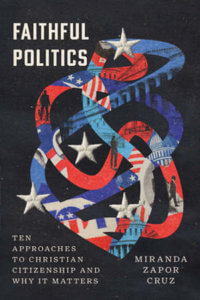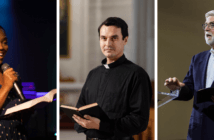Christian faithfulness can inspire various political approaches, but they must reflect our primary identity as citizens of the Kingdom of God. Miranda Zapor Cruz finds Kingdom citizens are most faithful when they are salty, prophetic, separationist, and pluralist. She maintains that faithful Christians engage the political realm with a distinctively Christian perspective that prioritizes God’s values over partisan allegiance.
While Christian faithfulness can lead to a range of political approaches, underlying any approach should be a discernable Christianness. We should inhabit the political world in a way that marks us as citizens of the Kingdom of God first. Kingdom citizens are most faithful when we are salty, prophetic, separationist, and pluralist.
Salty
Being salty requires us to be clear about the demands of our Christian faith and to communicate in a way that causes others to value the dimension of flavor we offer. If we are Kingdom citizens first, we will recognize when the demands of faith diverge from the party line. If we agree with our parties about everything, we have lost our saltiness and allowed our Kingdom citizenship to be distorted by party allegiance. Salt, in the correct proportion, makes things taste better. Salt is also a preservative. It can slow the natural process of decay. Our salty participation in the political process should help ward off the self-destructive tendencies of political divisiveness and rancor.
Saltiness does not come naturally. Our natural tendency is to allow our worst instincts free rein, thereby living into the effects of sin instead of embodying redemption. Redeemed people are called to be salt, which requires us to stir up the grace that is in us that we may be in and for the world according to Christ’s command. Christians should be gracious and humble, yet clear, as we communicate our positions and points of deviation from the party line. Partisan politics has trained us to dehumanize those across the party divide. When we hurl epithets and accusations at enemies, we dehumanize them and ourselves. When we recognize God in the face of other people, we are disarmed and can add salt where savory flavor is desperately needed.
Prophetic
Being prophetic requires us to see reality clearly, then bear witness to truth through words and actions. It does not mean claiming to have special authority or secret revelations about the future. We look to the biblical prophets as models for our call to prophetic truth-telling. The Hebrew prophets had one job: speak the truth as God revealed it. Prophetic truth reveals God’s nature and purposes, lifting the veil that separates the sin-sick world from its healer. The Hebrew prophets spoke truth to those in power, particularly when the powerful worshiped idols, amassed wealth through unjust means, oppressed the poor, or disregarded the Sabbath. Thomas Gillespie explains, in the New Testament, “authentic prophecy bears witness to the reality and meaning of the Lordship of Jesus in accordance with the salvation event that effected his exaltation” (The First Theologians, Eerdmans, 1994).
Prophets reveal the truth about the suffering we cause and the ripples of suffering across history. Prophetic truth-telling also reveals the hope and promise of God’s final victory, inviting people to participate in the already-but-not-yet Kingdom of God. Kingdom citizens are prophetic when our speech or action reveals God’s divine will, bears witness to Jesus Christ, and discloses the implications of Christ’s lordship for our political contexts. Thus, the call to prophetic truth-telling requires attentiveness to the Spirit of God, so we can discern truth and proclaim it courageously.
Separationist
Separation allows us to clearly differentiate the Kingdom from the country, even as our Kingdom citizenship informs and relativizes our civic engagement. Separation, does not, however, require us to privatize our Christian beliefs and remove our convictions from public discourse. Instead, separation allows us to bring our convictions into our civic engagement in a way that invites people to consider their veracity, instead of a way that demands others submit to them.
Separation gives Christians the opportunity to show love and hospitality by safeguarding our neighbors’ religious liberties. Christian defense of religious liberty is an act of love and hospitality toward our religiously diverse neighbors and a downpayment on our own future religious liberty in a country with a declining Christian majority. Religious liberty for Christians is only as safe as religious liberty for practitioners of other religions.
Social
Kingdom citizens ought to retain, and in some cases reclaim, a social understanding of Christianity and consider the political implications of the commandment to love our neighbors. Kingdom citizens recognize that humans bear the image of God in our social nature, not only in our individuality. Our understanding of the image of God begins with our Creator, who is one God and three persons. The three persons eternally indwell such that one person of God cannot be conceived of apart from the others. A trinitarian concept of humanity in the image of God means we are inseparable from each other. This truth has serious political implications, because our political engagement can be either an expression of American individualism or Christian mutuality.
The social focus of Kingdom citizens moves us away from a dehumanizing utility calculous or a self-seeking hedonism, and moves us toward evaluating our political actions according to their impact on those whom society deems less valuable. In recent years “social justice” has acquired a negative connotation for some Christians, who associate justice with secular political movements so strongly that they reject justice itself along with these movements (Ryan Burge, “Even Christians who are Democrats are abandoning the Social Gospel,” Religion News Service, October 6, 2022). Christians disagree about the proper role of the government in rendering aid to the poor or intervening in private business to advance equity. We have different philosophies about what approaches to charity are most effective in the short and long terms. But the command to care for widows and orphans or to love our neighbors as ourselves is not as hard as we sometimes make it out to be.
Pluralist
Pluralism means Christians are secure in God’s sovereign authority over all creation, which frees us from grasping for political control. Christians can promote human flourishing within a diverse and complex society, including through influencing government, motivated by the common good instead of fear of losing power. Pluralism sets limits around the roles of different spheres of society, which guards against tyranny, including religious tyranny.
Further, pluralism allows Christians to work alongside diverse neighbors for the common good. Kingdom citizens need not fear displacement by or cooperation with people of diverse religions, because God is sovereign and through common grace instills humanity with a capacity to promote human flourishing for the sake of the common good, even if—perhaps especially if—we do not dominate politics or culture.
 Taken from Faithful Politics by Miranda Zapor Cruz. Copyright (c) 2024 by Miranda Zapor Cruz. Used by permission of InterVarsity Press, P.O. Box 1400, Downers Grove, IL 60515, USA. www.ivpress.com. The book is available at InterVarsity Press, Cokesbury, and Amazon.
Taken from Faithful Politics by Miranda Zapor Cruz. Copyright (c) 2024 by Miranda Zapor Cruz. Used by permission of InterVarsity Press, P.O. Box 1400, Downers Grove, IL 60515, USA. www.ivpress.com. The book is available at InterVarsity Press, Cokesbury, and Amazon.
Related Resources
- Christians and Public Policy: Be Engaged, Informed, and Conflicted by Miranda Zapor Cruz
- The Church and Election Day by Doug Powe and Ann Michel
- Leading Between Faith and Patriotism by Lovett Weems







